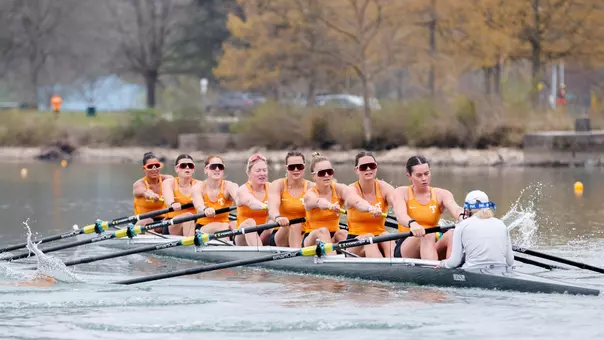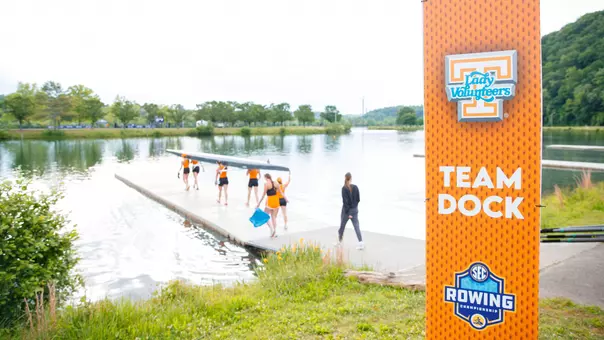University of Tennessee Athletics
Chojnacky Volunteers for U.S. Army, Tennessee
April 28, 2016 | Rowing
 By Cody Gross
By Cody Gross
Many student-athletes develop leadership qualities as they compete in their sport. Tennessee rower Nicole Chojnacky honed her leadership skills in the heat of combat.
Chojnacky, a sophomore on the rowing team, served as an active duty soldier for two years with the United States Army, spending 10 months in Afghanistan.
As a combat medic with the Army, she treated battle wounds, sewed stitches and planned for potential attacks.
Chojnacky's leadership skills evolved in Afghanistan, and those qualities push members of the Tennessee rowing team today.
"She never has become a drill sergeant, but I definitely see leadership in the way she completes her workouts," teammate Chandler Frumin said. "She is very focused and determined to finish. I have never seen her give up on anything, which is motivating in a sense to other girls who are struggling through a workout."

The Decision to Serve

Chojnacky on a mission in Afghanistan (Photo courtesy of Chojnacky)
Chojnacky grew up in Jerome, Idaho, a town with just more than 11,000. For much of her childhood, she played basketball, softball, soccer and track.
After graduation, many of her classmates went to the College of Southern Idaho, a local community college. Chojnacky wanted something different. She recalled a group of Army recruiters that visited her high school.
"They would come to our high school to recruit people, and I thought it was cool," she said. "I got goose bumps, but I never really thought I would join."
A few months after graduation, though, she sat in the military recruiter's office and enlisted as an active duty member in the Army.
Although Chojnacky considered joining the reserve, she chose full-time duty.
"I told myself that I have to step out of that comfort zone and just go for it," she said.
Going for it led to two and a half months of constant physical tests. Chojnacky endured basic training at Fort Jackson, South Carolina, where she remembers sweating through four-hour workouts at 2 a.m. to toughen up.
"They are all in your face, and they try to just break you down and build you back up," she said. "That is the goal. You can't let your guard down. They are going to yell at you. You just have to be ready for whatever."
A Desire for Deployment

Chojnacky with the Explosive Ordinance Disposal (EOD) Unit where she served as a field medic for one of their field trainings (Photo courtesy of Chojnacky)
When basic training concluded, Chojnacky began job training for 68 Whiskey, the military occupational specialty code for combat medic. She worked as a certified nursing assistant in high school, influencing her choice to be a combat medic.
"That was something that I had in the back of my mind that I thought I wanted to do," she said.
After four and a half months of job training, she reported to Fort Campbell, which straddles the Kentucky-Tennessee border near Clarksville, Tennessee.
She hoped her unit would be deployed, but that assignment never came.
"We never got orders, but I volunteered," she said. "There was a unit around ours that was deploying, and I wanted to get out of there and go."
Her feet hit the Afghan dirt in 2013. She had heard others talk about Afghanistan, but nothing prepared her for the reality.

Chojnacky in the field with her platoon for training (Photo courtesy of Chojnacky)
"When you first get there, you don't know," Chojnacky said. "You hear things, but it didn't hit me until we first got bombed. They have alarms, and the alarms go off. You are getting mortared. You hear the alarm, 'Incoming. Incoming.' The rocket is in the air. That is when it first hits you."
Fearful at first, the three to four bombs per week aimed at her station became customary. The closest bomb hit within 250 meters according to Chojnacky. Another one struck a local bus stop.
While recognizing threats, she continued treating injuries. On average, her clinic saw more than a hundred patients daily.
"Everything is on me if something does happen," she said. "I have to help keep them alive. You have to take that leadership position."


















